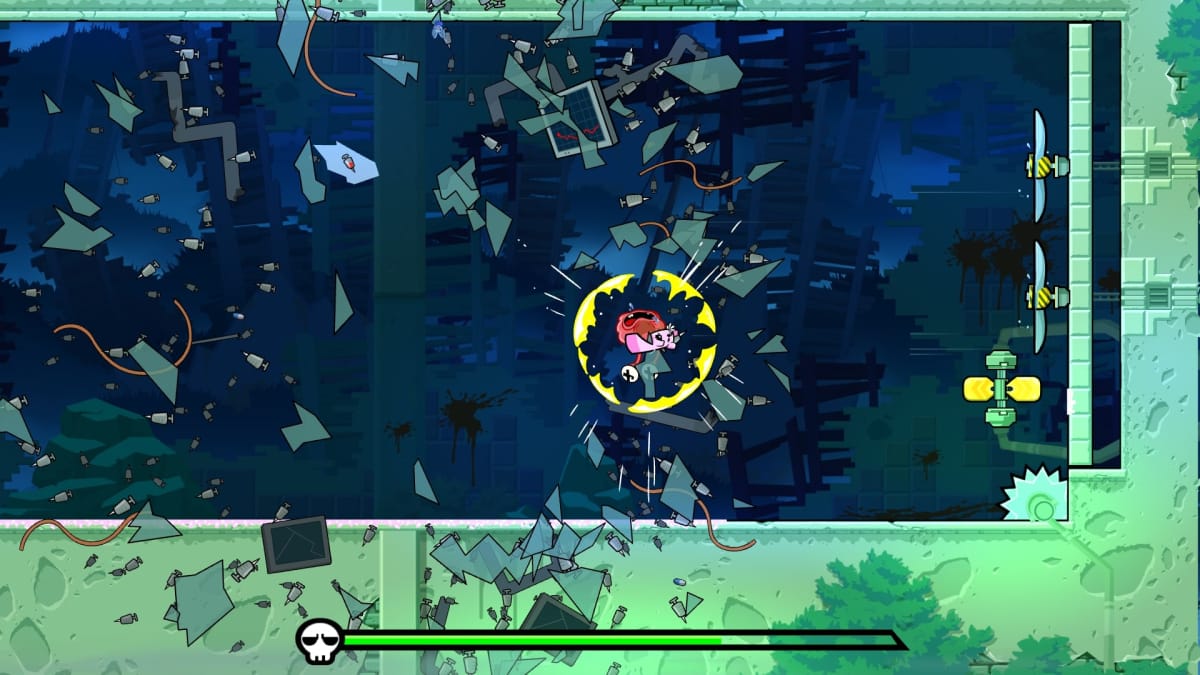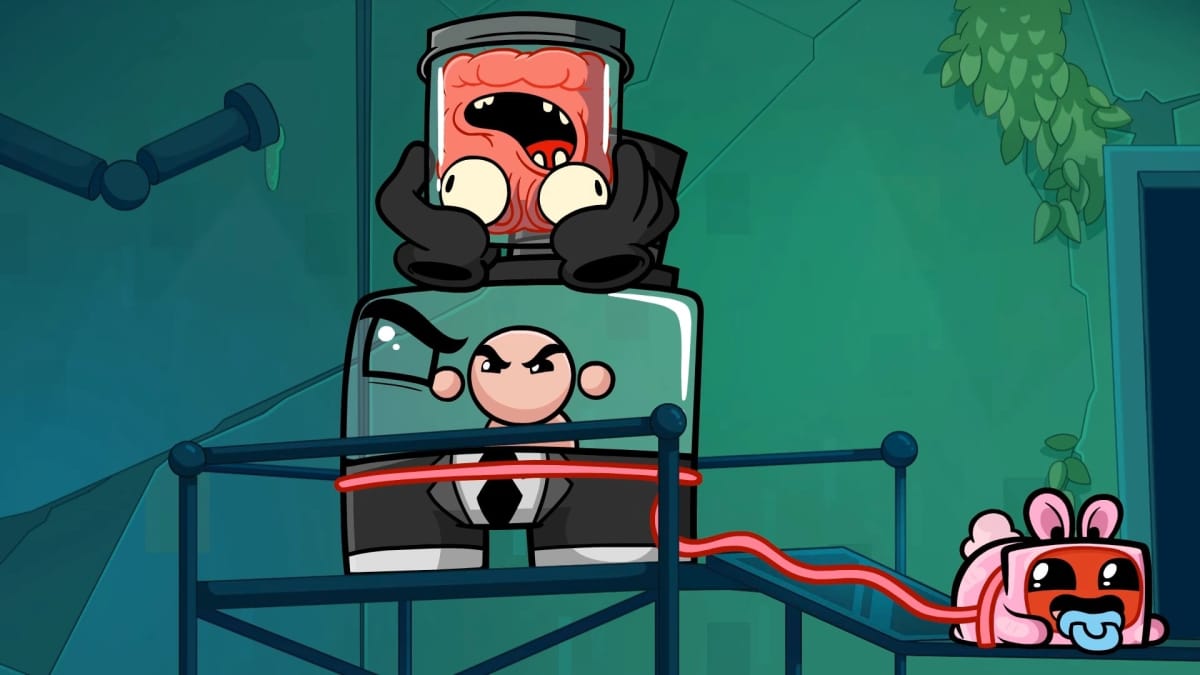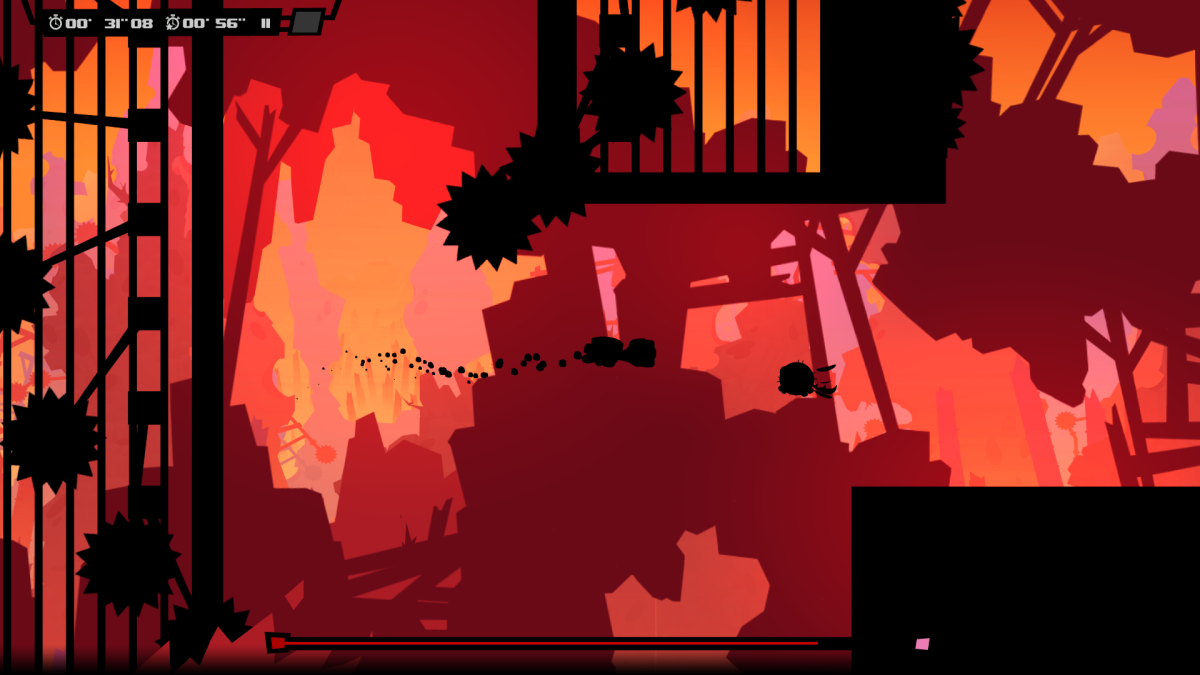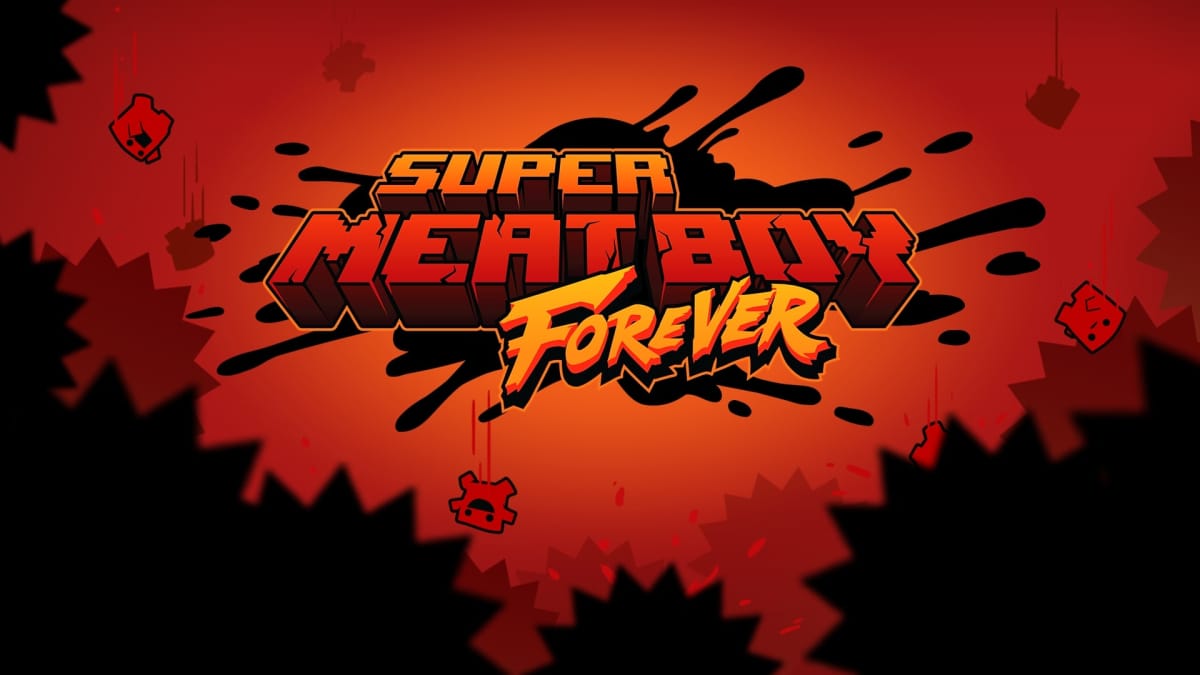Team Meat’s hotly-anticipated blood-spattered auto-runner, Super Meat Boy Forever, has landed. It isn’t a bad game but I couldn’t help find it disappointing. As a sequel to 2010’s highly-acclaimed 2D platformer Super Meat Boy, it has huge boots to fill. Super Meat Boy Forever is definitely more polished than its predecessor and a lot of the changes that Team Meat has made are improvements. Somehow, though, the resulting game is less than the sum of its parts. Super Meat Boy Forever has lost what made the original so good: exceptional gameplay and level design.
The original Super Meat Boy took the industry by storm when it came out in 2010. At the time, many perhaps thought that the delights of pure 2D platforming had been exhausted or, at the very least, well-plumbed. With the benefit of hindsight, this obviously isn’t the case but you can kind of see the logic. By 2010, the platforming genre had reached the grand old age of 29, with a decorated lineage stretching back to Donkey Kong in 1981. 3D platforming dominated the late ‘90s and ‘00s, with Nintendo typically pushing the boundaries further and further in subsequent Mario titles. You could even argue that platforming altogether had become increasingly sidelined in favor of open-world and first-person shooter games.
Well, Super Meat Boy, alongside other genre hits such as Limbo, Trine, and Rayman Origins, showed the world that there was plenty of life in 2D platforming yet. It’s no exaggeration to say that its release was a springboard for the resurgence of legions of similar games over the last decade. There were no gimmicks to it, just level after level of tightly-constructed, exacting gameplay. Some levels were so fiendishly difficult, requiring frame perfect inputs, that it felt like you almost had to become Meat Boy to succeed, your aching thumbs spiritually entwined with his pulpy, rectangular body. He could only run, jump and dash but controlling him was so satisfying that it didn’t matter.
Looks Like Meat's Back on the Menu, Boys
How do you follow such a successful but simple game? Team Meat’s small squad of designers have seemingly spent the last decade working on an answer. Their approach with the sequel, Super Meat Boy Forever, is an interesting one. They expanded the visual and narrative aspects of the game but pared back the already minimalist gameplay even further. The result is a game that feels more polished but somehow loses the rugged charm and rigorous mechanics of the original.

The key difference gameplay-wise is that Super Meat Boy Forever is an auto-runner. Remember how I said that in the original that you could only run, jump and dash? Well, Team Meat removed running from that list. The sequel supposedly started life as a mobile game which explains why they changed it.
Having said that, I played the game on the Nintendo Switch, where the decision to remove running from the equation didn’t make as much sense. When I started playing, I hoped the auto-run feature would only last for a few levels and was disappointed that it persisted throughout the entire game.
Another key change is that levels are procedurally generated. This means that, apart from boss fights, the game randomly generates the level by compiling segments of possible gameplay loops. You could definitely argue that this increases the replay value but I wasn’t keen on this feature. The level is split into these chunks in that when you die (which you will do… a lot) you’ll respawn back at the beginning of the segment rather than the beginning of the level.
Why Go Out For A Burger When You've Got Steak at Home?
This approach is a little more casual-friendly but, again, loses something that made the original Super Meat Boy so absorbing. Yes, it was painful when you’d made it perfectly through a level after dozens of attempts only to choke at the last second and have to start from the beginning. But that only increased your elation when you beat it a couple of attempts later. There was a real joy to executing frame perfect inputs and navigating absurdly complex sequences of traps on muscle memory alone. Completing Super Meat Boy felt like an accomplishment. Getting to the end meant hard work and a great deal of improvement as a player. The checkpoint system of Super Meat Boy Forever means that each death is less painful but, equally, each victory is less joyous.
In the end, I actually feel like Super Meat Boy Forever has less replay value than its predecessor. While I was playing it, I couldn’t help but wish I was playing Super Meat Boy instead. The original’s exacting gameplay is much more rewarding and that’s always going to keep people coming back for more.
Happy Tree Friends
The story is the main area that’s been beefed up (pun intended) in Super Meat Boy Forever. Meat Boy and Bandage Girl return to confront the nefarious Doctor Fetus, who has captured their child, Nugget. The cutscenes are memorable, with a strong environmentalist theme that was totally absent from the first game. Super Meat Boy Forever is a very short game - it took me around five hours to run through the campaign once - but packs a surprising amount of exposition in.

The bloody wake left by Doctor Fetus’ ruinous contraptions is depicted through a rag-tag band of grizzled woodland animals who decide to strike back against him. There was nothing in Super Meat Boy that made you think or reflect, so I definitely see Team Meat’s decision to explore an environmentalist narrative here as a step in the right direction. In fact, I think it’s one of the few areas of the game that improves on the original.
Super Meat Boy Forever also has a polished look to it that its predecessor lacked. It eschews Super Meat Boy’s minimal, pixelated aesthetic - which stems from the series’ origins as an Adobe Flash game - in favor of cartoon visuals that would look at home on a kid’s TV program. The original, though rough around the edges, was actually quite evocative, especially for those of us who grew up playing Flash games at school when the teacher wasn’t looking. The slick cartoon look of Super Meat Boy Forever is certainly a technical improvement on this, though. It's consistently striking and colorful.

Team Meat is still refreshingly disinclined to hold the player’s hand at any points. The mechanics of the obstacles, enemies, and items you encounter aren’t explained, leaving you to learn by doing and trying things out. I applaud this for the most part, although the method for overcoming some later encounters can be frustratingly obtuse. Sometimes the difficulty in Super Meat Boy Forever’s levels doesn’t come from pure platforming but from having to figure out how certain items work. Some people might enjoy this but, for me, it’s not what the series is about.
Dead Meat
All in all, Super Meat Boy Forever is a decent game. The story and visuals are cool, the platforming is fun and the procedurally generated levels mean there’s plenty of content to keep you occupied. If it didn’t have 'Super Meat Boy' in the title, this review probably would have been more complimentary. But it did and my expectations were that much higher as a result. Team Meat doesn’t seem to have fully grasped what made Super Meat Boy so universally adored by fans, critics, and even game designers. The original felt like a game that harkened back to an era when video games were simple to pick up, difficult to put down, and nigh on impossible to beat. By removing player agency and making it an auto-runner, Super Meat Boy Forever has lost something crucial. The feeling of kinship with a rectangular blob of flesh after completing a particularly fiendish level of traps, obstacles, and enemies on the 37th attempt is gone. I wouldn't trade that for all the flashy visuals in the world.
TechRaptor reviewed Super Meat Boy Forever on Nintendo Switch with a copy provided by the publisher. Currently, it is also available on PC.
Review Summary
Pros
- The Environmentalist Themes of the Story Are Well-Executed
- The Platforming Is Still Pretty Fun
Cons
- The Auto-Running Means Gameplay Is Less Absorbing Than The Original
- Adding a Checkpoint System Makes Completing a Level Less Satisfying
Have a tip, or want to point out something we missed? Leave a Comment or e-mail us at tips@techraptor.net








